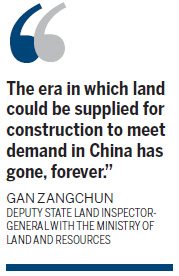Society
Illegal land grabs a growing problem
By Wang Huazhong (China Daily)
Updated: 2011-04-20 07:45
 |
Large Medium Small |
BEIJING - The "great" and "unrelenting" gap between available land and demand for construction sites has led China's top land supervisor to warn that there may be a growing number of illegal land seizures in the future.
Gan Zangchun, deputy State land inspector-general with the Ministry of Land and Resources, made his prediction against the backdrop of 8,612 people being punished last year for illegally using land.
"Frankly speaking, the era in which land could be supplied for construction to meet demand in China has gone, forever," said Gan, who was speaking at a press conference organized by the State Council's information office.
"The supply of land will be unrelentingly tighter and the tension it causes will accompany the whole process of China's urbanization, industrialization and modernization."

Based on a nationwide survey of demand for construction land in March, Gan said overall demand "greatly exceeds the total quota of land use set for 2011 ... and sends a strong warning signal that illegal land use is very possible to increase."
Gan's concerns echoed a call from Premier Wen Jiabao for efforts to be made to battle corruption in the procedures that oversee land-use approvals and land seizure.
Xu Shaoshi, the minister of land and resources, said in March "the system overseeing land and resources has become a realm in which corruption occurs easily and frequently".
According to the State Land Inspection Report released by the ministry on Tuesday, supervisors and law enforcement officers discovered 34,200 cases in 2010 that involved the misuse of almost 50,000 hectares.
The report looked at the use of 132,000 hectares of land in 77 cities between 2007 and 2009.
The report not only underscored the need to fight corruption but highlighted the fact that some land, once illegally seized, is lost forever. For instance, unauthorized highways cannot be confiscated or demolished after they are completed, Gan said.
"We have been beset with this issue for years and are yet to find a solution," he said.
The report cited State- and provincial-level major projects that had illegally seized 22,000 hectares of land - 45 percent of the total amount of misused land. The misappropriated land included 10,000 hectares that had previously been arable land.
Much of that land - 46 percent of the total - was used to build transportation infrastructure, such as roads and railways.
Gan said his ministry is working with other ministries in the hope of establishing a legal and regulatory framework to strengthen scrutiny in the application and approval procedures for land use.
China recovered 18.6 billion yuan ($2.8 billion) from illegal land-use practices in 2010, he said.
The recovered money included 4 billion yuan from fines, 13.2 billion yuan in land transfer revenue, 500 million yuan in royalties for new construction sites and 840 million yuan in land reclamation fees, he explained.
The government also restored about 4,160 hectares of land and made it available again for cultivation as well as added another 3,130 hectares of available farmland and reactivated 3,700 hectares of idle farmland that had remained unused after a project was approved, Gan added.
He stressed that China will strive to defend its guaranteed "red line" of 120 million hectares of available farmland during the period of the 12th Five-Year Plan (2011-2015) while focusing on improving the quality of farmed land.
Gan added that the country will work to protect the 104 million hectares of primary farmland that are currently in use, explaining that this land is the best quality and therefore the most suitable for grain production.
| 分享按鈕 |



